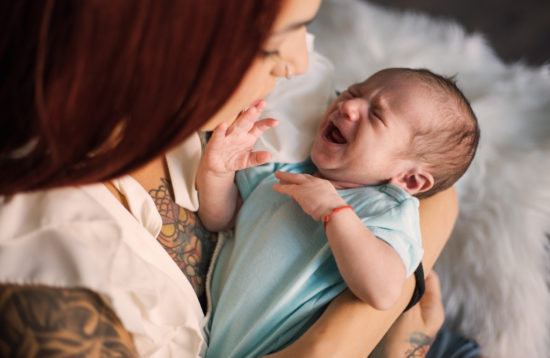It can be really challenging when your little one is under the weather and it’s difficult not to worry, especially if you’re a first-time parent. Here are some facts about baby coughs and colds.
It’s normal for children attending primary school to have five to eight colds a year. Children’s colds usually get better in around a week, but can last longer in younger children, hanging around for up to 14 days.
What if my baby has a cold?
If your baby has a runny or blocked nose looks unwell, or isn’t interested in the usual things, they might have a cold. They may feel sweaty or hotter than usual when you touch their back or chest.
A healthy baby has a temperature of between 36°C and 37°C. You can get to know your baby’s normal temperature by checking it when they’re well. A digital thermometer, which you can buy from your pharmacy or supermarket, may show when their temperature is higher than usual.
A temperature of 38°C is very high for a baby under three months old, and from three to six months 39°C is considered high.
If babies who are already on solids are not eating well, their loss of appetite is probably only going to last for a couple of days. So, as long as they’re drinking milk, try not to worry too much about it.
Make sure you wash your hands and those of your baby’s regularly, and don’t let them share towels or cups with someone who has a cold. Good baby groups will also wash the toys regularly, which will reduce the chance of catching a cold but not remove it.
This is because the benefits have not been shown to outweigh the risks in children under six years old. From one year old, simple remedies such as warm honey and lemon can be used.
If your baby is feeding, drinking, eating and breathing normally and there’s no wheezing, there isn’t usually anything to worry about. However, see your GP or call 111 if:
If your child is having trouble breathing, go to the emergency department or contact 999.
If a cough lasts for a long time and is worse at night or after running around, then it could be asthma. For more information about when to call your GP about your baby, see our article here.
Ear infections are common and often turn up on the back of a cold. Signs and symptoms that your baby has an ear infection might include:
Most ear infections get better by themselves within about three days and should be better after a week. See a GP if the ear infection is not clearing up.

Also, see your GP if your child has:
The best ways to treat an ear infection are:
Don’t put anything into the ear, such as oil, ear drops or cotton buds.
To help avoid inner ear infections:
Don’t put cotton buds into the ear
To help avoid outer ear infections:
The first symptoms of whooping cough (pertussis) are similar to those of a cold so it’s important to be aware of it. Babies under six months old are usually those most severely affected by whooping cough, which is very contagious.
Other symptoms that start around a week after the initial cold include:
Contact your GP or NHS 111 if you think your baby under six months old has whooping cough
Contact your GP or NHS 111 by phone or online straightaway if you think your baby under six months old has whooping cough, or if a bad cough is getting worse. Treatment for babies under six months old is usually in hospital.
If the baby or child is stopping breathing or is finding it hard to breathe, call 999 or go to your local emergency department. The same is true if the child is having chest pain or seizures.
A person with whooping cough is infectious from about six days after they were infected until three weeks after the coughing bouts start.
Whooping cough treatment includes:
If you’re pregnant, you can help protect your baby by getting vaccinated. Ideally, you’d do this from 16 weeks up to 32 weeks pregnant but you can have it up until you go into labour. Babies are also offered vaccinations at eight, 12 and 16 weeks old.
Our support line offers practical and emotional support with feeding your baby and general enquiries for parents, members and volunteers: 0300 330 0700.
You might find attending one of NCT’s Early Days groups helpful as they give you the opportunity to explore different approaches to important parenting issues with a qualified group leader and other new parents in your area.